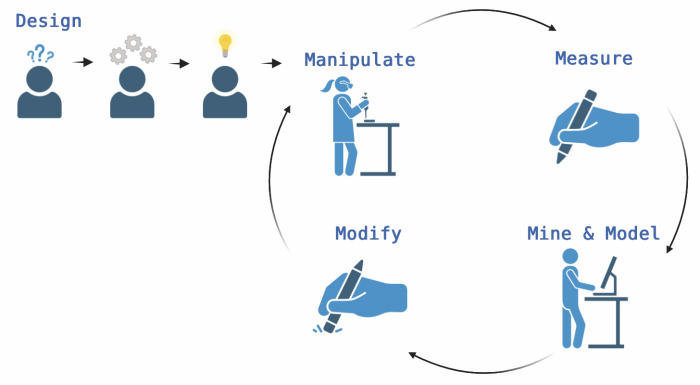Difference between revisions of "20.109(F24):Module 3"
Noreen Lyell (Talk | contribs) (→Module 3: Project design) |
Noreen Lyell (Talk | contribs) (→Module 3: Project design) |
||
| Line 7: | Line 7: | ||
At the core of scientific discovery is building on the research of others to push the field forward. To accomplish this an iterative process is used to answer research questions: manipulate, measure, mine and model, and modify. | At the core of scientific discovery is building on the research of others to push the field forward. To accomplish this an iterative process is used to answer research questions: manipulate, measure, mine and model, and modify. | ||
| − | '''Design:''' Before the iterative process of scientific discovery can | + | '''Design:''' Before the iterative process of scientific discovery can begin, you must first design an experiment. The existing literature is an important resource at this stage as it provides information on what has already been done. In addition, the literature is useful in identifying which types experimental methods are appropriate for collecting the data needed to achieve your specific research goal. |
'''Manipulate:''' Experiments are the mechanism used by scientists to test hypotheses and answer research questions. Throughout the semester we discussed the importance of well-designed experiments and the value of controls. In addition, it is critical that experiments are performed using sound scientific technique to ensure the data are reliable and accurate. | '''Manipulate:''' Experiments are the mechanism used by scientists to test hypotheses and answer research questions. Throughout the semester we discussed the importance of well-designed experiments and the value of controls. In addition, it is critical that experiments are performed using sound scientific technique to ensure the data are reliable and accurate. | ||
Latest revision as of 14:35, 20 June 2024
Contents
Module 3: Project design
At the core of scientific discovery is building on the research of others to push the field forward. To accomplish this an iterative process is used to answer research questions: manipulate, measure, mine and model, and modify.
Design: Before the iterative process of scientific discovery can begin, you must first design an experiment. The existing literature is an important resource at this stage as it provides information on what has already been done. In addition, the literature is useful in identifying which types experimental methods are appropriate for collecting the data needed to achieve your specific research goal.
Manipulate: Experiments are the mechanism used by scientists to test hypotheses and answer research questions. Throughout the semester we discussed the importance of well-designed experiments and the value of controls. In addition, it is critical that experiments are performed using sound scientific technique to ensure the data are reliable and accurate.
Measure: It is not enough to just do an experiment. For the work to be meaningful, the data need to be collected and analyzed. The methods used for this stage in the process are just as important as those used for designing and performing the experiment. The type of analysis used is dependent on the experimental approach employed and on how the data are typically presented in the field. It is important that researchers in your same area of expertise are able to understand the data.
Mine and Model: After the data analysis is complete, it is time to figure out what the results mean in the context of the research question. As in the designing stage, here the existing literature is an important resource. The literature often provides context for your results. By exploring the literature it is possible to find links to your data that support the results.
Modify: Though the last stage in this list, this step really leads to a more refined research question and often will require you to design and perform a new experiment. Now that you have completed the stages of an experiment, here you use the results and information you gathered to improve the initial plan!
Research goals
In this module you will engage in the first step in this process by working with your co-investigator (or laboratory partner) to develop a research proposal in the field of biological engineering. Though this may seem like a daunting task, the goal of this module is to walk you through the process!

